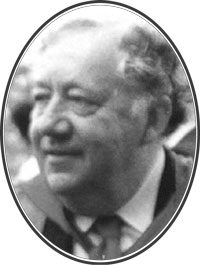During a diverse career as pharmacist, research synthetic chemist, pharmacologist and medical practitioner, George Eckert was always a charismatic teacher across this diverse knowledge base. He strongly influenced generations of students, doctors, dentists, and pharmacists through coaching, tutoring, mentoring, lecturing and published research.
George was born in Sydney on 24 October 1931. He was educated at Sydney Boys’ High School, and studied pharmacy at the University of Sydney, graduating in 1951.
After spectacular success as a pharmacy academic at the University of Sydney and private tutor to over 1000 students from 1953 to 1965, George changed direction and studied medicine, graduating with honours in 1968. He trained in the Department of Clinical Pharmacology at St Vincent’s Hospital, then, from 1974 to 1980, directed the first NSW Health Commission-funded Clinical Pharmacology unit at Sydney Hospital. In 1984, he transferred to St George Hospital, Kogarah, where he stayed until his retirement in 1992. During this time, he was responsible for changing methods of prescribing and managing drugs in hospitals and for instituting quality-assurance and risk-management procedures that are now benchmark best-quality practice worldwide in all areas of medical practice and healthcare delivery. He influenced the flow of information about drugs, believing that those who prescribed, administered and dispensed them, and the people who received them, were all entitled to more information about their use and effects than they were getting. He engaged in what he called “counter-detailing”: giving practitioners a view of drugs independent of that supplied by pharmaceutical companies, and often at odds with it. He was fearless and selfless in the public interest, passing up lucrative offers from pharmaceutical companies that were widely available to clinical pharmacologists and other medical specialists in that period.
George had the many gifts and true modesty of a polymath. He had a creative intellect, bringing together his diverse education and life-long learning. The examiners for his Doctor of Medicine thesis wrote: “This thesis is to be highly commended, as it is so novel. It is so far ahead of the prevailing orthodoxy conceptually that it is not likely to be widely understood or appreciated until there is a broadening of pharmaceutical and pharmacological training.” He had an encyclopaedic knowledge of history (ancient and modern), music, opera, film, chess and cricket, and shared these interests with friends of all ages.
George’s greatest gift was his capacity for friendship with a wide range of people in his diverse life roles. He saw the world as one moulded by human strengths and weaknesses, and shared his insights with kindness, compassion and humour.
Towards the end of his life, suffering from prostate cancer, he faced his illness with stoicism, dignity and courage, and died at home among family and friends on 17 May 2004.
Allan J McLean, Lisa L Demos, Constantine G Berbatis





